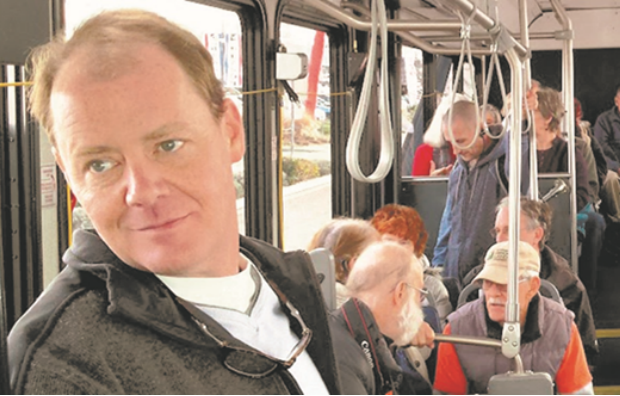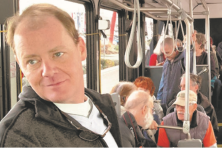In this guest blog, Alison Wiley interviews Scott Chancey, General Manager of Josephine Community Transit, a rural transit agency based in the southwest Oregon town of Grants Pass. Scott Chancey plans to soon order JCT’s first three electric buses. This interview first appeared in Alison Wiley’s Electrifying Transit e-newsletter, and is posted here with permission. It has been edited for length.
This is part of a series of articles on Electrifying Transportation.
Alison Wiley: How and why did you first get interested in electric buses?
Scott Chancey: Back in 2015, a local woman called and suggested them to me. Soon, Proterra came out here to Grants Pass with a demonstration bus and I got a first-hand, direct experience. You can actually see out the rear window! An open, airy, light feeling really jumped out at me, also the QUIETNESS. It’s a good passenger experience. And my drivers liked it, which is a big deal. The Proterra bus looks different, sleeker, futuristic.
Wiley: What has kept you interested since that first experience?
Chancey: I’m motivated by fiscal responsibility. The cost savings over my diesel buses will be $800 per month per electric bus in fuel alone. Maintenance will give me additional savings. Keep in mind that [unlike many transit agencies] I get almost no local funding. So, cost savings mean a lot to me. And when I save operating funds [fuel and maintenance are operating funds], I save a lot in match.
“I’m motivated by fiscal responsibility. The cost savings over my diesel buses will be $800 per month per electric bus in fuel alone.”
Wiley: Some transit agencies are happy with their buses that run on compressed natural gas (CNG), others with propane. Those fuels have lower emissions than diesel, but more than electric. Thoughts?
Chancey: I’m no longer having conversations about buses that run on CNG or propane. The change to electric propulsion is happening very quickly.
Wiley: The research both you and I have done shows that charging infrastructure is more challenging, and takes longer to build, than the electric buses themselves. Please talk about your plans for this.
Chancey: I’ve got existing voltage in my transit yard for three chargers/three buses, but not in exactly the right place. So I’ll be putting in a transformer. I’ll also put in a smart charging system. It will know when one bus is fully fueled, then move on to charge the next bus. My cost will be about $50,000 per charger, parts and labor included.
Wiley: Research also shows that an agency’s fleet manager is a make-or-break with electrification. That person must embrace the new technology to have any chance of success.
Chancey: I’ve talked with my fleet manager. He’s not scared of making this transition from diesel to electric, and his mechanics aren’t, either. Every e-bus manufacturer says they will send staff to train our mechanics. But we’re so small here, I’m not so sure. There needs to be a training program for electric bus mechanics built into our community college system through the Clean Cities Coalition.
Wiley: Josephine Community Transit got Enhance [federal transit] funds a few years ago to build a transit hub in downtown Grants Pass, rounded out by CMAQ dollars [federal transportation funds focused on congestion and air quality]. How do you see electric buses tying in with your transit hub, or not?
Chancey: I plan to have a depot charger in my downtown transit hub for our electric buses to get topped off. I may also have a charger for passenger vehicles, so that EV owners can charge while they shop or eat downtown.
"It’s critical to get on this path. Whether you have environmental or fiscal concerns, electric buses satisfy those concerns."
Wiley: Buses of all kinds take a year or more to build once you order them. When will you order your first electric buses?
Chancey: Probably this spring. But I’ve been saying that for a year. I’m analyzing heavily who I will buy from. Maybe I should lease my first electric buses, the way that Anchorage and other transit agencies are doing. There’s some uncharted territory here. You have to make a leap of faith at some point. I’m getting more comfortable with the unknown.
Wiley: What advice would you give to other transit managers?
Chancey: It’s critical to get on this path. Whether you have environmental or fiscal concerns, electric buses satisfy those concerns.

